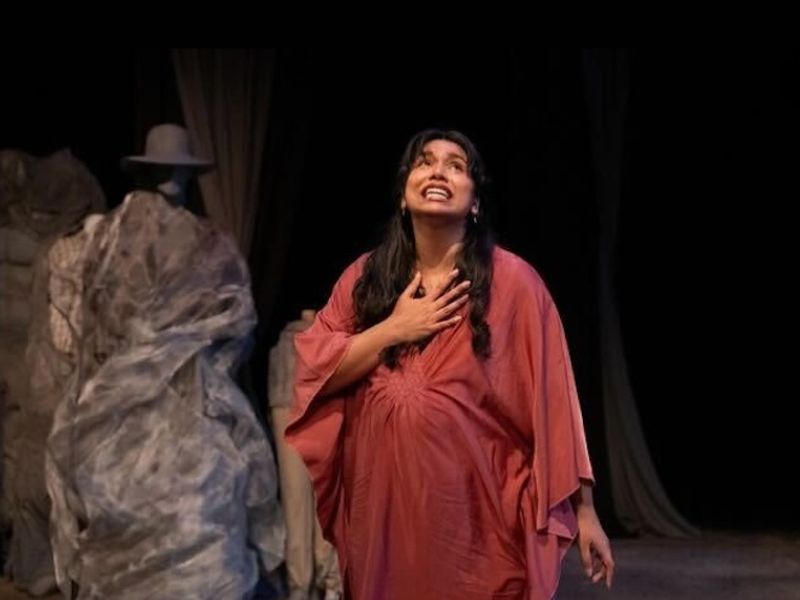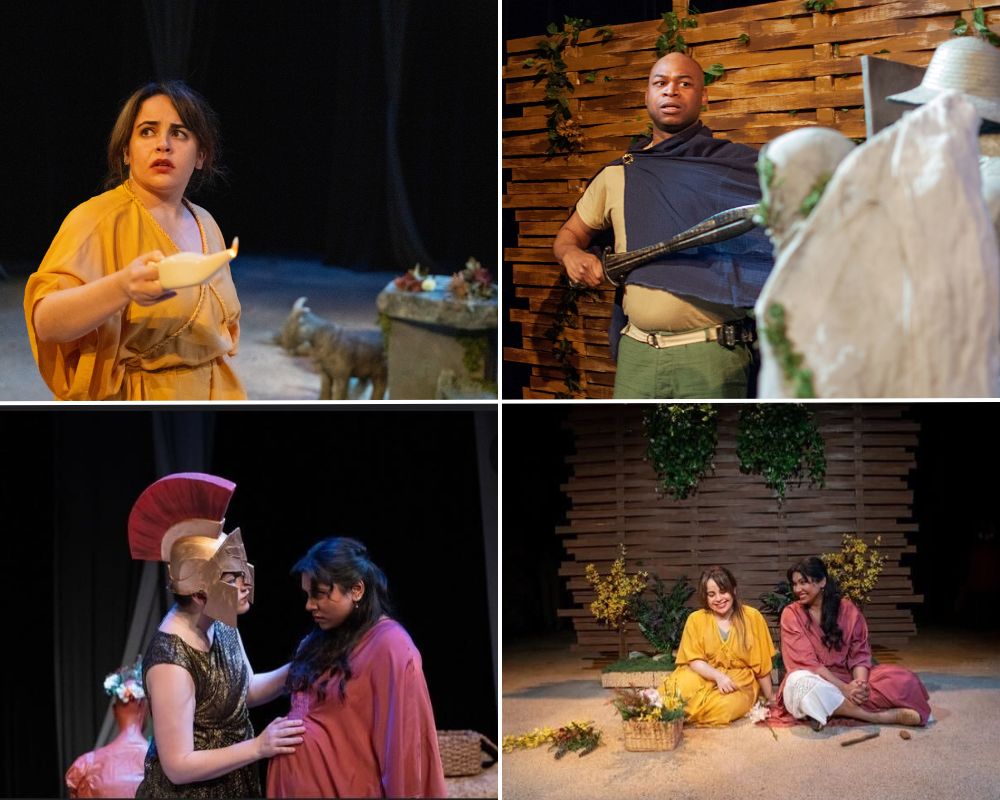If you’re not caught up on your Greek mythology, you might think Dua: The Monster’s Story is one of these adaptations like Maleficent, Wicked, Cruella, Joker, and recent Grinch media arguing that a famous villain deserves a reexamination and your sympathy. But what makes this play interesting is its exploration of how it wasn’t Ovid’s text that maligned Medusa in the first place; it was us having not read it.
In Ovid’s Metamorphoses, Medusa is a beautiful innocent who enters the temple of Athena, where she is raped by Athena’s husband Poseidon. Athena punishes Medusa and not Poseidon — of course — by turning her hair into snakes and making her so hideous that anyone who looks at her turns to stone. When Medusa is forced into isolation in a cave for her monstrosity, Athena equips “hero” Perseus with tools as he goes to kill her, even as she is pregnant with children she conceived with Poseidon. She is utterly denied justice or mercy.
Of course, as it goes in the classical literary tradition, plenty of different writers recorded texts about Medusa. Ovid was the one to introduce the rape narrative, and his text is common in the character’s literary history. While it is not entirely clear in the Latin text whether Ovid meant to label what occurred in the temple a rape (the scholarly debate is over the word “vitiasse” in the original Latin text, which stems from the root word vitiō, which can mean “to corrupt and make faulty,” which could indicate a consensual interaction, and/or “to violate sexually,” which would not). Regardless, the rape-narrative interpretation of Ovid’s text is common enough, as is the public’s ignorance of it, to invite interpretations like Dua.

Dua: The Monster’s Story by Robin Berl, who also directs this Theatre Prometheus production, walks through the monster named Medusa’s life, naming her Dua. We see how she once had a life: she has a sister she loves named Euryale, a life she loves, and hobbies: she is a sculptor and artist. She has fears about marriage, reinforced by her to-be-wed sister’s fears of marital rape. We see this life she had only after we have seen how she has taken to living life isolated in a cave constantly invaded by men who hear the voice of a woman inside and seek to violate her, men whom she has no choice but to look at and turn to stone. She lives the best she can, creating a sculpture of her sister that is her only company while she is pregnant with twins. She picks and stores flowers that her sister once recommended to her to aid in conception, contraception, and childbirth, attempting with mixed results to make the best of the place the gods have forced her into.
Caitlyn Hooper is a force of nature as Dua. For almost the entire show’s 90-minute runtime, she performs profound grief and physical agony. She screams and sobs throughout with soul-wrenching affect from grief over her lost life, her sexual violation, and the pain of childbirth. She delivers an unforgettable performance you cannot look away from, projecting the full force of a survivor’s grief and even embodying grief itself. When she screams as Perseus enters her cave to kill her while she is actively in labor, we are so enveloped by her screams of horror and physical anguish that we become one with her.

The show’s cast skillfully plays the characters involved with and affected by the crimes against Dua. In her discovery of Dua’s murder, Marley Kabin as her sister Euryale projects grief with equally striking skill and impact. Emma Wesslund’s Athena is a female enabler of men’s violence against women, suggesting that even members of oppressed groups can be complicit in harm. Interestingly, this production does not mention that Athena’s husband was the one in Ovid’s text — which the production roots itself in per the program — making Athena’s cruelty toward Dua seem even more irrational and free of reason. At one juncture, Dua makes an altar to Athena and sacrifices a goat she turned to stone, and the goddess appears before her, completely unwilling to hear her side of the story. On top of that, Athena says she will send a hero to kill Dua. This is a bit of a departure from Ovid’s text, where Athena merely equips Perseus with a mirror, but it is important to remember that Dua is about not merely unpacking Ovid’s text but showing the injustice survivors and women have faced for millennia. Perseus, expertly played by Elgin Martin, is touched by Dua’s explanation of her plight but refuses to let this woman’s pleas get through his entrenched principles and ideas about who is usually right and what is usually true.
The production’s set was carefully designed by Simone Schneeberg, with gray and black curtains woven around each other to create the impression of classical columns. Dua’s cave houses stone sculptures of her attackers, which look incredibly like stone despite appearing to be painted Styrofoam and fabric. The sculptures are frequently moved across the floor, and the sound of Styrofoam occasionally halts the suspension of disbelief — perhaps a sound effect of the movement of a stone sculpture could mask it.
The costume chosen for Dua also halts the suspension of disbelief — she is not given snakes for hair, which works thematically and passes well. It would make sense in this adaptation that Dua would look like a more regular woman, but her costume from the beginning to the end of the show is a pristine pink toga. If she has been living alone in a cave for nine months, and is enduring for much of that time a pregnancy that has prevented her from being able to fully care for herself, her costume should reflect that — dirt, grime, and texturing on her face and costume would help with this impression, especially if it were to increase over the course of the performance.
If you don’t usually pay attention to content warnings, you should for this show’s, which mentions that the show contains “discussion but not depiction of rape/sexual assault, imagery depicting a male forcibly entering a woman’s home enacting violence against her, pregnancy and childbirth, sexism/misogyny, animal death, and human death.” Even if you haven’t experienced these traumas, if you love someone who has, or if you are sensitive to discussions of grief, be advised of these warnings. The Director’s Note in the program acknowledges this, stating that “not every content warning is sufficient preparation and not every story can be experienced safely. We are all carrying and holding so many stories.” These performances are so affectingly delivered that you will almost certainly be uncomfortable.
In thoughtful theater, that is generally a good thing, and in Dua, it makes this production a masterwork.
Running Time: 90 minutes with no intermission.
Dua: The Monster’s Story plays through June 1, 2024, presented by Theatre Prometheus performing at Montgomery College Cultural Arts Center, 7995 Georgia Avenue
Silver Spring, MD. Purchase tickets (general admission, $30; students free) online.
COVID Safety: Masks required at all performances.
Dua: The Monster’s Story
CAST
Caitlyn Hooper: Dua
Marley Kabin: Euryale & Exhale
Elgin Martin: The Hero & Men
Emma Wesslund: Athena & Inhale
Mani Yangilmau: Swing (all roles)
PRODUCTION TEAM
Alex Aspiazu: Consulting Doula
Robin Berl: Director & Playwright
Ileana Blustein: Production Manager
Di Carey: Sound Designer
Tracey Erbacher: Line Producer
Mari Fluegeman: Dramaturg
Amanda Geyer: Costume Designer
Shana Laski: Assistant Director
Eric McMorris: Technical Director
Scott Monnin: Lighting Designer
Megan Parlett: Assistant Dramaturg
Simone Schneeberg: Set Designer
Emma Sloane: Stage Manager
Rooster Sultan: Props Designer
Mia Fairweather & Amanda Zeitler: Run Crew
Movement choreography for Inhale and Exhale by Shana Laski




